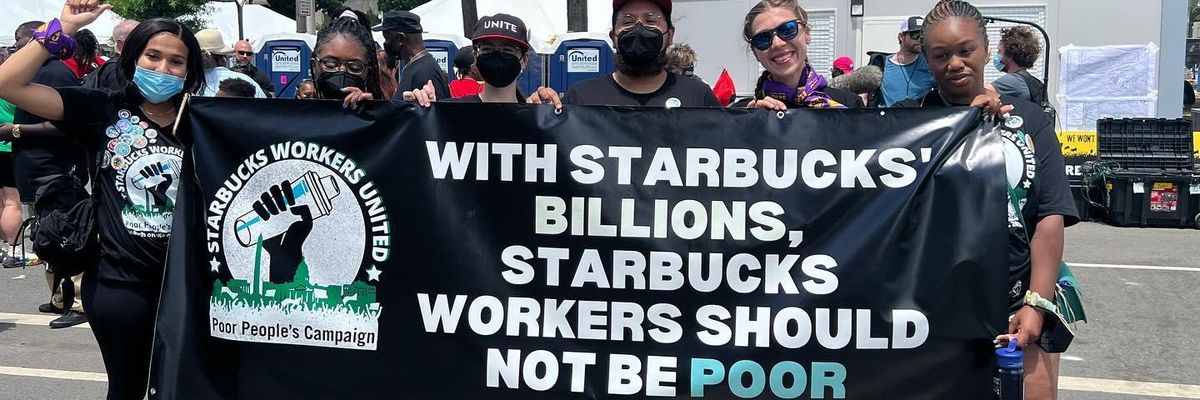"It's important that we're recognized as people rather than profit machines," said one Louisiana barista. "We don't have another choice but to stand together.
"

Starbucks Workers United members and supporters rally in Washington, D.C. on June 18, 2022.
(Photo: Starbucks Workers United/Facebook)
BRETT WILKINS
Feb 20, 2024
COMMON DREAMS
Employees at 21 Starbucks stores across the United States informed the global coffee giant's CEO on Tuesday that they are launching the largest single-day unionization in company history.
The baristas—who are employed at Starbucks in 14 states—said in a letter to CEO Laxman Narasimhan that they've "decided to follow in the footsteps of over 396 other stores and nearly 10,000 partners to demand better."
Their union, Starbucks Workers United, cited low pay, inconsistent scheduling, and safety concerns as reasons for filing for union elections.
"Though we work at different stores, we are united through our shared experiences and in our demand for higher wages, fair and consistent scheduling, improved benefits, and a safe and dignified workplace," said the workers, who are called "partners" by the company.
"Starbucks has made a habit of prioritizing sales and profits over partner safety," the baristas alleged. "We have worked through violent threats from customers, unsafe weather conditions, and a global pandemic. Despite our willingness to work regardless of this disregard for our health and safety, we have been met with higher and higher expectations without being given the resources to meet them."
The letter continued:
We "partners" demand a say. We are the face of Starbucks. As employees, we deserve the same respect and dignity as the CEO. This dignity includes fair pay, clear communication with all partners, a say in the decisions that affect our day-to-day, better power balance, and manageable expectations. Partners are not merely your workers but human beings, who have the right to pursue happiness outside of our work.
Lizzie Harlow, a barista at a Sulphur, Louisiana Starbucks, toldHuffPost that "it's important that we're recognized as people rather than profit machines."
"We don't have another choice but to stand together," Harlow added.
A Starbucks spokesperson said that the company respects its workers' right to unionize.
"We encourage all partners at stores petitioning for representation to get the facts, make an informed choice, and ensure their voices are heard by voting in neutral, secret-ballot elections," the spokesperson said.
According to the National Labor Relations Board—which has repeatedly taken action against Starbucks' union-busting—Workers United has won more than 80% of the roughly 400 union elections at the company's U.S. stores.
The U.S. is currently experiencing a labor organizing renaissance. According to the U.S. Bureau of Labor Statistics, union membership grew by nearly 200,000 last year alone. From Starbucks to strip clubs, American workers are forming or joining unions at rates not seen in decades.
Public support for organized labor is also its highest level in generations, with 71% of Americans including 88% of young people viewing unions favorably.
However, just 10% of U.S. workers belong to a union—the lowest rate ever recorded.

Starbucks Workers United members and supporters rally in Washington, D.C. on June 18, 2022.
(Photo: Starbucks Workers United/Facebook)
BRETT WILKINS
Feb 20, 2024
COMMON DREAMS
Employees at 21 Starbucks stores across the United States informed the global coffee giant's CEO on Tuesday that they are launching the largest single-day unionization in company history.
The baristas—who are employed at Starbucks in 14 states—said in a letter to CEO Laxman Narasimhan that they've "decided to follow in the footsteps of over 396 other stores and nearly 10,000 partners to demand better."
Their union, Starbucks Workers United, cited low pay, inconsistent scheduling, and safety concerns as reasons for filing for union elections.
"Though we work at different stores, we are united through our shared experiences and in our demand for higher wages, fair and consistent scheduling, improved benefits, and a safe and dignified workplace," said the workers, who are called "partners" by the company.
"Starbucks has made a habit of prioritizing sales and profits over partner safety," the baristas alleged. "We have worked through violent threats from customers, unsafe weather conditions, and a global pandemic. Despite our willingness to work regardless of this disregard for our health and safety, we have been met with higher and higher expectations without being given the resources to meet them."
The letter continued:
We "partners" demand a say. We are the face of Starbucks. As employees, we deserve the same respect and dignity as the CEO. This dignity includes fair pay, clear communication with all partners, a say in the decisions that affect our day-to-day, better power balance, and manageable expectations. Partners are not merely your workers but human beings, who have the right to pursue happiness outside of our work.
Lizzie Harlow, a barista at a Sulphur, Louisiana Starbucks, toldHuffPost that "it's important that we're recognized as people rather than profit machines."
"We don't have another choice but to stand together," Harlow added.
A Starbucks spokesperson said that the company respects its workers' right to unionize.
"We encourage all partners at stores petitioning for representation to get the facts, make an informed choice, and ensure their voices are heard by voting in neutral, secret-ballot elections," the spokesperson said.
According to the National Labor Relations Board—which has repeatedly taken action against Starbucks' union-busting—Workers United has won more than 80% of the roughly 400 union elections at the company's U.S. stores.
The U.S. is currently experiencing a labor organizing renaissance. According to the U.S. Bureau of Labor Statistics, union membership grew by nearly 200,000 last year alone. From Starbucks to strip clubs, American workers are forming or joining unions at rates not seen in decades.
Public support for organized labor is also its highest level in generations, with 71% of Americans including 88% of young people viewing unions favorably.
However, just 10% of U.S. workers belong to a union—the lowest rate ever recorded.
No comments:
Post a Comment